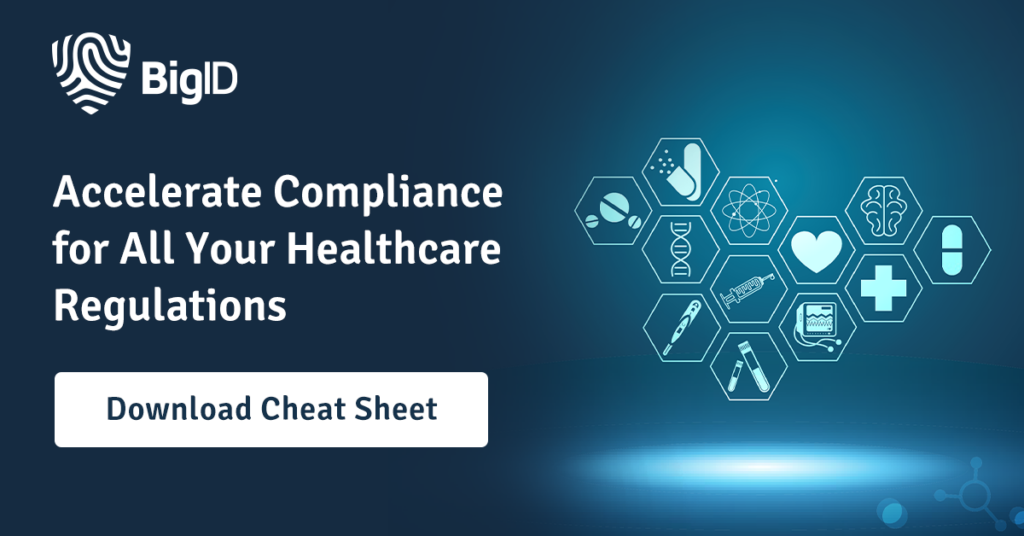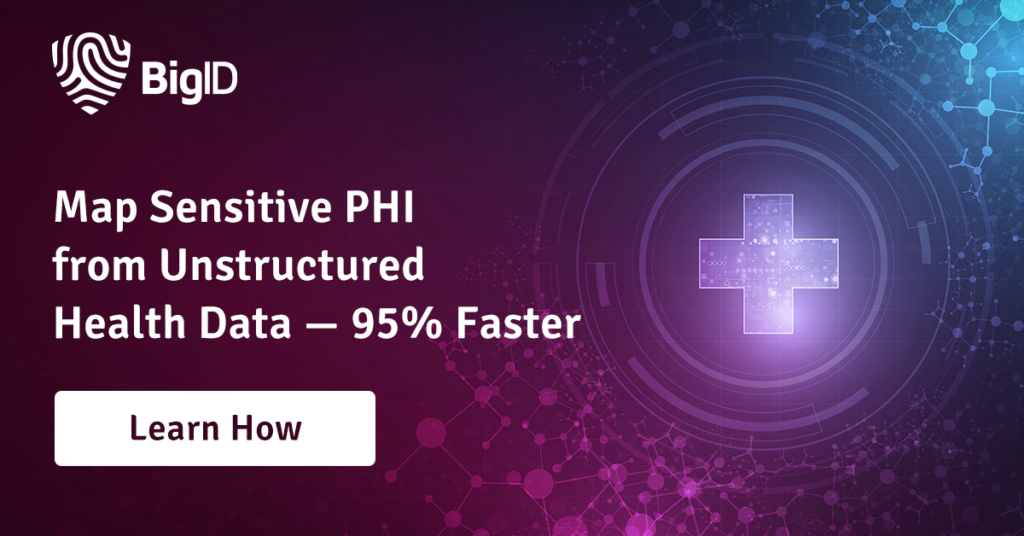Key Insights from the Guide to Healthcare Compliance and Data Protection
- Healthcare Compliance Safeguards Patient Trust
- Regulations like HIPAA, GDPR, and CCPA serve as essential guardrails for protecting patient privacy and ensuring ethical data handling.
- As AI transforms diagnostics and patient care, organizations must ensure transparency, fairness, and proper governance of health data in AI systems.
- With over 26 million individuals impacted in 2020 alone, healthcare remains one of the most targeted industries for data breaches—demanding stronger protections.
- Fines for HIPAA, Stark Law, and the Anti-Kickback Statute can reach tens of thousands per violation—along with potential exclusion from federal programs.
- From PHI to biometric and financial data, healthcare organizations must protect a wide array of personal identifiers subject to various overlapping regulations.
- HIPAA, HITECH, the 21st Century Cures Act, and newer rules like the Information Blocking Rule lay the groundwork for patient-centric, data-secure healthcare.
- Well-governed data enables responsible AI, interoperability, and better patient outcomes—turning compliance into a driver for digital health transformation.
- Identifying and labeling sensitive data at scale is essential for safeguarding health information and ensuring regulatory alignment.
- With ML-powered discovery, regulatory mapping, risk scoring, and automated enforcement, BigID helps healthcare leaders stay ahead of audits and breaches.
- Healthcare organizations must evolve their compliance strategies to match the pace of AI, analytics, and digital health—BigID enables that evolution.
In today’s rapidly evolving healthcare environment, healthcare compliance regulations have become the backbone of patient trust and data protection. These laws serve as the guardians of sensitive medical information, ensuring every diagnosis, record, and transaction meets the highest standards of confidentiality and care.
This article explores the laws that shape healthcare compliance, the rise of AI in medicine, real-world compliance challenges, and how BigID helps organizations lead with privacy, security, and governance by design.
What is Healthcare Compliance?
Healthcare compliance refers to the ongoing process of adhering to laws, policies, and ethical standards designed to protect patient health information and ensure quality care.
These laws require healthcare entities — from hospitals to insurers and tech vendors — to handle patient data responsibly, transparently, and securely.
Why Were Healthcare Compliance Laws Put in Place?
Healthcare compliance laws were enacted for several crucial reasons:
- Patient Privacy Protection: One of the primary drivers behind healthcare compliance regulations is to protect the privacy and confidentiality of patient information. Unauthorized access to medical records can lead to identity theft, fraud, and compromised patient care.
- Quality Assurance: Compliance laws ensure that healthcare providers deliver high-quality care. Adherence to these regulations helps prevent errors and negligence in healthcare services.
- Fraud Prevention: Healthcare fraud costs billions of dollars annually. Compliance regulations aim to curb fraudulent activities such as billing for services not rendered or providing unnecessary treatments.
- Data Security: The digital age has brought increased vulnerability to data breaches. Compliance regulations mandate the implementation of robust data security measures to protect sensitive patient information.

The Role of AI in Modern Healthcare
Artificial intelligence (AI) is transforming healthcare — from AI-powered diagnostic imaging to predictive analytics that improve patient outcomes.
But with innovation comes responsibility.
AI’s reliance on massive, sensitive datasets introduces new compliance challenges:
- Transparency: Ensuring explainable AI in clinical decisions.
- Bias Mitigation: Preventing inequitable outcomes in predictive care.
- Governance: Monitoring how AI systems collect, process, and share PHI.
Example: Predictive Analytics in Action
Hospitals using AI to predict patient readmissions have reduced unnecessary stays and costs — but only by maintaining strict controls over who accesses the underlying patient data.
Why Healthcare Compliance Matters: The Numbers
- 28.5% of all 2020 data breaches occurred in the healthcare sector.
- 26 million individuals were impacted by healthcare data breaches in 2020.
- $36.2 billion in improper healthcare payments were recorded in 2020.
These figures underscore the urgency of robust data protection and continuous compliance oversight.
Past Healthcare Information Compromises
Unauthorized Access: In 2015, the UCLA Health System suffered a massive data breach that affected 4.5 million patients. The breach occurred when hackers gained unauthorized access to sensitive patient records, exposing patients to potential identity theft and medical fraud.
Negligence and Data Exposure: In 2019, a medical billing company, American Medical Collection Agency (AMCA), fell victim to a breach that exposed personal and financial data of over 20 million patients. The breach was attributed to inadequate data security measures and negligence.
Healthcare Compliance Violations and Fines
Violations of healthcare compliance regulations can lead to severe consequences. Here are some common violations and their associated fines:
| Regulation | Violation Type | Maximum Penalty |
|---|---|---|
| HIPAA | Breach of patient data confidentiality | $50,000 per violation |
| Anti-Kickback Statute | Accepting or offering payment for patient referrals | $25,000 per violation + jail time |
| Stark Law | Physician self-referrals for financial gain | $15,000 per service and program exclusion |
Compliance isn’t just a legal requirement — it’s a moral obligation that protects patients, caregivers, and the integrity of the healthcare system.
Safeguarding Patient Data: 8 Key Healthcare Regulations
Patient data protection is paramount in healthcare, and various regulations have been enacted over the years to ensure its security. Understanding healthcare compliance regulations is crucial in navigating the intricacies of the healthcare industry. To shed light on this subject, let’s explore a timeline of significant healthcare regulations:
1. HIPAA (Health Insurance Portability and Accountability Act) (1996)
HIPAA is a cornerstone in patient data protection. It mandates strict standards for the confidentiality and security of individually identifiable health information. Covered entities and business associates must implement safeguards to protect patient data and notify individuals of breaches.
2. HITECH Act (2009)
The HITECH Act complements HIPAA by enhancing penalties for data breaches and promoting the adoption of electronic health records (EHRs). It emphasizes the importance of secure electronic health information exchange, bolstering patient data protection.
3. 21st Century Cures Act (2016):
The 21st Century Cures Act was initially enacted to promote scientific innovation, alleviate administrative burdens, enhance data sharing and privacy protections for patients, and improve overall healthcare for patients.
4. GDPR (General Data Protection Regulation) (2018) (EU)
Though not a U.S. regulation, GDPR impacts U.S. healthcare entities dealing with European patients. It sets strict rules on data protection, including health data, and requires informed consent for data processing, imposing hefty fines for non-compliance.
5. CCPA (California Consumer Privacy Act) (2020) (California)
CCPA grants California residents rights over their personal information, including health data. It obliges businesses to disclose data practices and allows individuals to request the deletion of their data, enhancing patient data protection.
6. HITRUST CSF (Health Information Trust Alliance Common Security Framework) (Various)
HITRUST is not a regulation but a framework that aligns healthcare organizations with multiple security and privacy standards. It provides a comprehensive approach to safeguarding patient data and gaining compliance with various regulations.
7. Information Blocking Rule (2021)
Enforced by the Office of the National Coordinator for Health IT (ONC), this rule prohibits information blocking practices that hinder the sharing of patient data. It encourages interoperability while ensuring patient data remains secure.
8. Interoperability and Patient Access Final Rule (2021)
This rule, enforced by the Centers for Medicare & Medicaid Services (CMS), promotes patient data access and exchange. It requires healthcare providers to share electronic patient data upon patient request, furthering patient data protection by giving patients more control.
Understanding Sensitive Healthcare Data
Types of Protected Health Information (PHI)
- Personal Identifiers: Name, address, Social Security number.
- Medical Information: Diagnoses, prescriptions, lab results.
- Financial Data: Insurance and billing records.
- Biometric Data: DNA, fingerprints, retinal scans.
Data Protection Best Practices
Healthcare organizations must implement:
- Automated data discovery and classification tools.
- End-to-end encryption and tokenization.
- Rigorous access controls and activity monitoring.
- Regular risk assessments and vendor evaluations.
How Regulations Provide Enforcement and Guidance
Healthcare regulations deliver clear guidance frameworks that:
- Promote accountability for data stewardship.
- Enhance transparency in patient data handling.
- Establish standardized procedures for breach response.
- Support innovation through compliance clarity.
These guardrails not only enforce trust but also foster secure digital transformation across the healthcare ecosystem.
How BigID Empowers Healthcare Compliance
Navigating the complexity of overlapping regulations is challenging — but BigID makes compliance intelligent, automated, and actionable.
With BigID, Healthcare Organizations Can:
- Know All Their Data: Discover and catalog PHI/ePHI across the enterprise, even in silos.
- Automate ML Classification: Use AI to identify sensitive health data with accuracy and context.
- Reduce Risk Exposure: Detect high-risk data flows and access anomalies before they lead to violations.
- Align with Regulations: Map internal data handling to HIPAA, HITECH, CCPA, GDPR, and more.
- Enable Responsible AI: Govern datasets fueling AI models to ensure fairness and explainability.
BigID’s AI-driven data intelligence platform helps healthcare organizations turn compliance from reactive to proactive, driving efficiency, trust, and readiness.
The Future: From Compliance to Confidence
In an era where data is the backbone of healthcare innovation, compliance equals confidence. As AI and analytics continue to reshape patient care, healthcare providers must ensure their data governance frameworks evolve just as fast.
With BigID, organizations don’t just meet healthcare regulations — they master them.
Ready to future-proof your healthcare compliance strategy? Schedule a 1:1 demo with our experts today.



